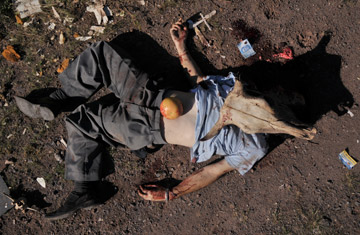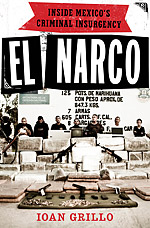
A corpse is decorated by gangsters in Sinaloa, Mexico. Since 2006, Mexico has seen tens of thousands of drug-related murders
(2 of 2)
"When you belong to organized crime you have to change. You could be the best person in the world, but the people you live with change you completely. You become somebody else. And then the drugs and liquor change you."
I have watched too many videos of the pain caused by killers like Gonzalo. I have seen a sobbing teenager tortured on a tape sent to his family; a bloodied old man confessing that he had talked to a rival cartel; a line of kneeling victims with bags over their heads being shot in the brain one by one. Does someone who has committed such crimes deserve redemption? Do they deserve a place in heaven?
Yet, I see a human side to Gonzalo. He is friendly and well mannered. We chat about lighter issues. Perhaps in another time and place, he could have been a stand-up guy who worked hard and cared for his family — like his father, who, he says, was a lifelong electrician and union man.
I have known angry, violent men in my home country; hooligans who smash bottles into people's faces or stab people at soccer games. And on the surface, those men seem more hateful and intimidating than Gonzalo as he talks to me in the prison cell. Yet they have killed nobody. Gonzalo has helped turn Mexico at the dawn of the 21st century into a bloodbath that has shocked the world.
In his 17 years in the service of the mafia, Gonzalo witnessed extraordinary changes in the Mexican drug industry.
He began his career in Durango, the mountainous northern state that is the proud birthplace of Mexican revolutionary Pancho Villa. It is also near the heartland of smugglers who have taken drugs to America since Washington first made them illegal. After dropping out of high school and abandoning his hopes of becoming an NFL quarterback, Gonzalo did what many young tough nuts in his town did: he joined the police force. It was here he learned the highly marketable skills of kidnapping and torture.
The path from policeman to villain is alarmingly common in Mexico. Major drug lords, such as the 1980's "Boss of Bosses" Miguel Angel Felix Gallardo, began as officers of the law, as did notorious kidnapper Daniel Arizmendi, alias the Ear Lopper. Like them, Gonzalo left the police after a reasonably short stint, deserting when he was 20 years old to pursue a full-time criminal career.
He arrived in Ciudad Juárez and did dirty work for an empire of traffickers who smuggled drugs along a thousand miles of border from east of Juárez to the Pacific Ocean. The year was 1992, glorious days for Mexico's drug mafias. A year earlier, the Soviet Union had collapsed and governments across the world were globalizing their economies. A year later, Colombian police shot dead cocaine king Pablo Escobar, signaling the beginning of the demise of that country's cartels. As the 1990s went on, Mexican traffickers flourished, moving tons of narcotics north and pumping back billions of dollars amid the surge in free trade created by NAFTA. They replaced Colombians as the dominant mafia in the Americas. Gonzalo provided muscle for these gangster entrepreneurs, pressuring (or kidnapping and murdering) anyone who didn't pay their bills. And he became a rich man, earning hundreds of thousands of dollars.
But by the time of his arrest 17 years later, his job and his industry had changed drastically. He was leading heavily armed troops in urban warfare against rival gangs. He was carrying out mass kidnappings and controlling safe houses with dozens of victims bound and gagged. He was working with high-ranking city police officers, but fighting pitched battles against federal agents. And he was carrying out brutal terror, including countless decapitations. He had become, he tells me, a man he did not recognize when he stared in the mirror.
"You learn a lot of forms of torture. To a point you enjoy carrying them out. We laughed at people's pain — at the way we tortured them. There are many forms of torture. Cutting off arms, decapitating. This is a very strong thing. You decapitate someone and have no feeling, no fear."
Understanding the Mexican drug war is crucial not only because of morbid curiosity at heaps of severed-brain cases — but because the problems in Mexico are being played out across the world. We hear little about communist guerrillas in the Americas these days, but criminal uprisings are spreading like bushfire. In El Salvador, the Mara Salvatrucha forced bus drivers into a national strike over anti-gang laws; in Brazil, the First Command torched 82 buses, 17 banks and killed 42 policemen in one coordinated offensive; in Jamaica, police clashed with supporters of Christopher "Dudus" Coke, leaving 70 dead. Are pundits going to insist this is just cops and robbers? The Mexican drug war is a frightening warning of how bad things could get in these other countries; it is a case study in criminal insurgency.
Many Salvadoran gang bangers are the sons of communist guerrillas — and call themselves combatants just like their fathers. But they don't care about Che Guevara and socialism, just money and power. In a globalized world, mafia capitalists and criminal insurgents have become the new dictators and the new rebels. Welcome to the 21st century.
 From El Narco: Inside Mexico's Criminal Insurgency. Copyright© 2011 by Ioan Grillo. Published by Bloomsbury Press.
From El Narco: Inside Mexico's Criminal Insurgency. Copyright© 2011 by Ioan Grillo. Published by Bloomsbury Press.
